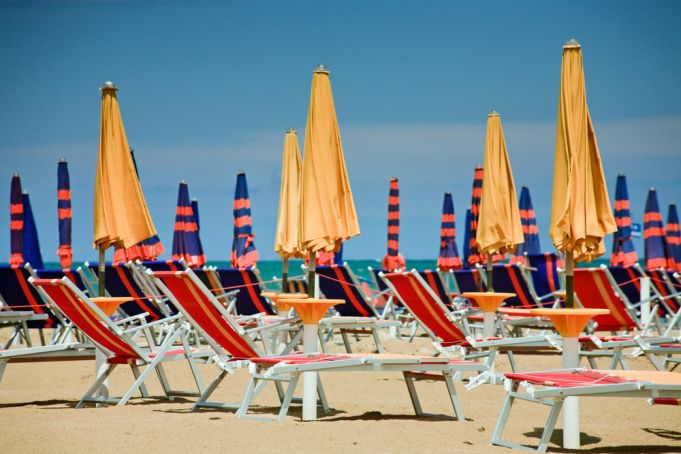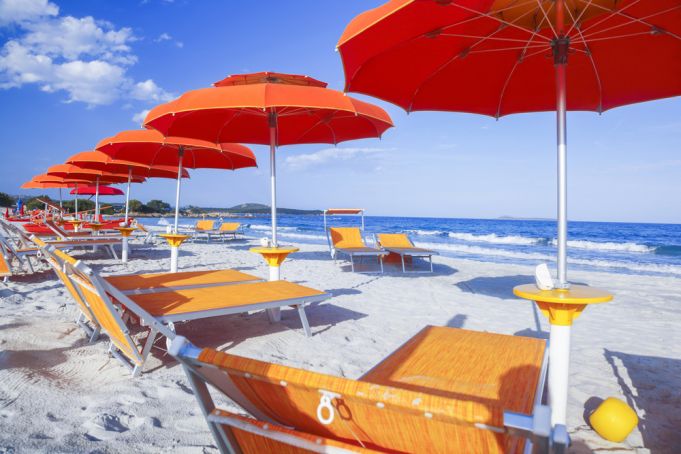Giorgia Meloni defies EU by blocking overhaul of Italy's beaches
Nationalists clash with Europhiles in Italy as parliament votes to delay EU law revoking beach concessions for Italy’s private lidos. President Mattarella agrees to enact changes but expresses his concerns.
Holiday at the seaside in Italy, and you’re likely to find yourself squeezed into a line of parasols and sunbeds on one of the many privately-run bathing clubs that clutter the country’s coastline.
These lidos, known as stabilimenti balneari, are a ubiquitous part of Italy’s beach holiday experience. Of Italy’s 8,000-km of coastline, nearly 60 per cent of it is rented out by the state to private establishments, which range from seaside shacks to mega resorts offering restaurants, discos and swimming pools.
Loved and hated by Italians in equal measure, lidos have also been the subject of an increasingly tense standoff between Rome and Brussels: the EU has long harboured concerns about their monopoly over Italian beaches and has pushed for new laws to ensure fairer competition.
Controversial reform
However, this week, much to the dismay of the European Commission, prime minister Giorgia Meloni stepped in on the side of beach club owners by postponing a controversial reform that could have spelt the end of many of Italy's traditional seaside clubs.
The law, which would have come into force from 31 December 2023, forces beach club owners to give up their rights to operate on Italian beaches. Instead, they must compete for new concessions with other interested companies from across the EU.
But Meloni’s Milleproroghe decree, which was finally approved on Thursday in Italy’s lower house, has provided a one-year extension for existing concessions, giving the seaside entrepreneurs a precious few months of extra time.

In siding with the lidos, Meloni has infuriated the opposition parties in Italy and driven a wedge into the faultlines between Italian nationalists and Europhiles in the country. Importantly, by defying Europe, she has added fuel to the embers of an already charged, and increasingly fractured, relationship between Rome and Brussels.
In Ostia, Rome's seaside beach town, the owner of the Venezia beach club, Ruggero Barbadoro, is explaining why he thinks Meloni has just saved Italy's beach industry from a looming disaster.
Family business
“Beach clubs like ours are family-run businesses. So taking away the concessions and forcing us to bid for them against rich multinational businesses is a complete disaster. We simply can’t compete,” he says.
Barbadoro’s father began renting his strip of Ostia beach in 1958. Today, Barbadoro’s lido, a sprawl of wooden cabanas, concrete changing rooms and five-aside football pitches, still sustains his daughters and nephew’s families, who also work on the resort.
It estimated that 98 per cent of beach-based businesses in the country are family-run, according to data published by Federazione Italiana Imprese Balneari (FIBA), a group that represents the interest of beach resort owners.
Alex Giuzio, a journalist and author who has written a book on Italy’s beach lidos, believes these family businesses are integral to Italian beach culture. “When tourists come to the coast, it's traditional to go back to the same family-run resort where the managers know your name. Through the generations, you go back to the same parasol and have the same lifeguard. It’s an historic and unique part of Italy.”
Outside competition
The prospect of opening up these family businesses to outside competition has divided the left and the right for a decade. Successive governments have tended to avoid the issue altogether. Many fear that once the reform comes into place, Italy’s beaches could begin to look a lot more like the sleek and perhaps more sterile clubs found in places like Mykonos or the Caribbean where foreign investment has been allowed to flow in.
More than 100 days into her tenure, Meloni has been fashioning herself as a champion of family tradition and small businesses. She knows that defending the clubs in the face of EU pressure speaks to the gut of many of her voters. But her critics argue that she is merely protecting the interests of a few well-connected business groups at the expense of the general public.
High prices
The central criticism of privatised beaches is that lido managers charge high prices (and generate millions in annual revenues) while paying just a few thousand euro a year in fees to the government for the privilege. Resorts typically charge between €20-30 a day but this can rise to €150 in the more upmarket resorts.
The Corriere della Sera newspaper reports that in 2022 the minimum canone, or rent paid by most lidos to the state, was €2,698, equivalent to renting out two parasols for three months at €15 a day.
As the lidos become increasingly unaffordable for the average Italian family, many consider their chokehold over the coastline unacceptable. The European Commission, Mario Draghi, and many of Italy’s opposition parties, argue that the beach club licensing reforms would liberalise the market and ensure fair prices for all.
However, lido owners and their supporters on the Italian-right, argue that the rush to liberalise the beach market and to comply with the European directive, Bolkestein, at all costs should be avoided. Reform must be thought-through carefully.

"Under Italian law, the government is free to hike the canone whenever they like. If they think we pay too little, they could do it even tomorrow. The reform doesn't help that - it is two separate issues,” says Massimo Rustignoli, president of the Federazione Italiana Imprese Balneari.
Rustignoli has been actively lobbying the government last week for a delay to the reform. “We want them to take more time to develop a clear methodology on how the reform would work in practice, in order not to make mistakes.” The government put forward a similar justification this week and asked for a mapping of the maritime domain to understand the situation in more detail by next year.
Ecological concerns
It is less clear whether Meloni will use the extra 12 months to understand the ecological concerns around the private lidos. Sun-baked umbrellas and deckchairs may be a quaint feature of the Italian coastline but environmental campaigners have been drawing attention to the critical damage they are doing to the country’s coastline for years.
In places like Ostia, lidos have built vast concrete - sometimes illegal - structures, like swimming pools, walls, and even hotels. These constructions have endangered fragile biodiversity on the coasts and polluted the waters. The demand for pristine beaches means that seaweed, stones and driftwood have been removed, causing erosion.
“Turtles don’t vote,” says Marco Omizzolo, a well-known sociologist at La Sapienza University, who has spent years investigating ecological impact of beach establishment on Italian coastlines. “Beach clubs in places like Ostia have done material damage to coastlines… but Italy’s right-wing, which Meloni represents, has a very underdeveloped understanding of the environmental issue. It doesn't win votes, ” he says.
In Italy, where local administrations play a key role in regulating and policing the activities of lidos on beaches, local politicians and lidos have often fostered close relationships. It is well-known that regional votes can be won in small coastal communities by turning a blind eye to illegal constructions on beaches and their shadow economies, where cash is often king.
Illegal construction
Omizzolo wants the government to use the reform to take a tougher stance on the illegal buildings, as well as stop exploitation of illegal labour at the lidos. “Anything that is illegal should be demolished and the owner's rights to operate on the beach should be terminated. Of course, this will also help those who have built everything within the law,” he said.
In a sector where public property is often exploited for private gain, and where corruption has often lingered in the darkest corners, Italy’s debate around concessions is likely to continue to spark controversy and divide public opinion in the coming months.
It is likely Meloni will eventually have to bow to European law on beaches. But in the meantime she has consolidated her support - both nationally and at a local level - from those who see the country’s beach entrepreneurs as an integral part of summertime culture and economy.
More importantly, she has proved herself capable of facing down Brussels - at least for 12 more months.
By Charles Seymour


















